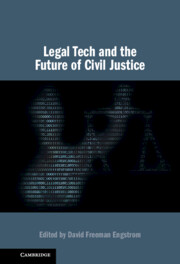Legal Tech and the Future of Civil Justice
New digital technologies, from AI-fired “legal tech” tools to virtual proceedings, are transforming the legal system. But much of the debate surrounding legal tech has zoomed out to a nebulous future of “robo-judges” and “robo-lawyers.” This volume is an antidote. Zeroing in on the near- to medium-term, it provides a concrete, empirically minded synthesis of the impact of new digital technologies on litigation and access to justice. How far and fast can legal tech advance given regulatory, organizational, and technological constraints? How will new technologies affect lawyers and litigants, and how should procedural rules adapt? How can technology expand – or curtail – access to justice? And how must judicial administration change to promote healthy technological development and open courthouse doors for all? By engaging these essential questions, this volume helps to map the opportunities and the perils of a rapidly digitizing legal system – and provides grounded advice for a sensible path forward. This book is available as Open Access on Cambridge Core.
David Freeman Engstrom is the LSVF Professor in Law and Co-Director of the Deborah L. Rhode Center on the Legal Profession at Stanford University. An award-winning scholar, longtime litigator, and nationally recognized expert on law and technology, Engstrom is an elected member of the American Law Institute, an appointed member of the Administrative Conference of the United States, and a faculty affiliate at the Stanford Institute for Human-Centered Artificial Intelligence.



